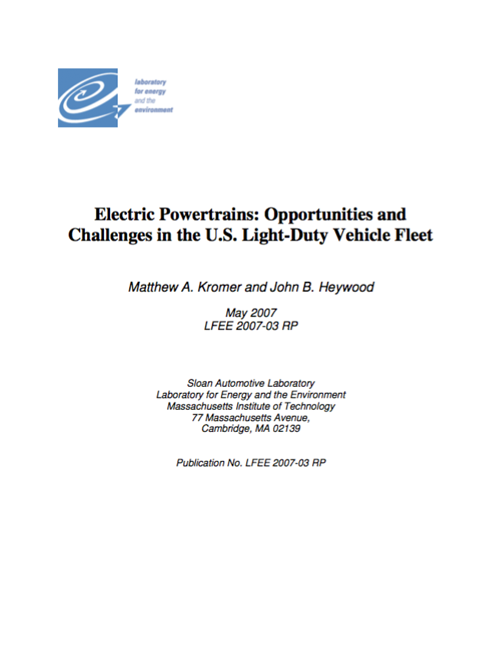
Electric Powertrains: Opportunities and Challenges in the U.S. Light-Duty Vehicle Fleet
Abstract
Managing impending environmental and energy challenges in the transport sector requires a dramatic reduction in both the petroleum consumption and greenhouse gas (GHG) emissions of in-use vehicles. This study quantifies the potential of electric and hybrid-electric powertrains, such as gasoline hybrid-electric vehicles (HEVs), plug-in hybrid vehicles (PHEVs), fuel-cell vehicles (FCVs), and battery-electric vehicles (BEVs), to offer such reductions.
The evolution of key enabling technologies was evaluated over a 30 year time horizon. These results were integrated with software simulations to model vehicle performance and tank-to- wheel energy consumption; the technology evaluation was also used to estimate costs. Well-to- wheel energy and GHG emissions of future vehicle technologies were estimated by integrating the vehicle technology evaluation with assessments of different fuel pathways.
While electric powertrains can reduce or eliminate the transport sectors reliance on petroleum, their GHG and energy reduction potential are constrained by continued reliance on fossil-fuels for producing electricity and hydrogen. In addition, constraints on growth of new vehicle technologies and slow rates of fleet turnover imply that these technologies take decades to effect meaningful change. As such, they do not offer a silver bullet: new technologies must be deployed in combination with other aggressive measures such as improved conventional technology, development of low-carbon fuels and fuel production pathways, and demand-side reductions.
The results do not suggest a clear winner amongst the technologies evaluated, although the hybrid vehicle is most likely to offer a dominant path through the first half of the century, based on its position as an established technology, a projection that shows continued improvement and narrowing cost relative to conventional technologies, and similar GHG reduction benefits to other technologies as long as they rely on traditional fuel pathways. The plug-in hybrid, while more costly than hybrid vehicles, offers greater opportunity to reduce GHG emissions and petroleum use, and faces lower technical risk and fewer infrastructure hurdles than fuel-cell or battery-electric vehicles. Fuel-cell vehicle technology has shown significant improvement in the last several years, but questions remain as to its technical feasibility and the relative benefit of hydrogen as a transportation fuel.
This research was funded by Ford Motor Company through the Alliance for Global Sustainability (AGS), CONCAWE, ENI, Shell, and Environmental Defense.